

IS UNIT WEB SITE - IPTS - JRC - EC. MOOCKnowledge.
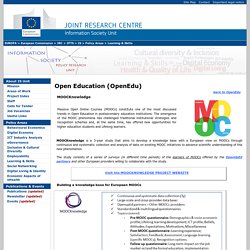
Gamificar MOOC redes. Curso Desarrollo e-Learning v2 - E-Aula. Un curso dictado 100% a través de Internet, con videos de excelente calidad que te explican paso a paso como sacar provecho de PowerPoint para crear tus primeras lecciones educativas interactivas multimedia, como convertirlas al formato Flash y HTML5 y como publicar tu contenido en Internet, utilizando herramientas gratuitas.
Descubre lo que nadie te enseña y muy pocos conocen sobre PowerPoint para desarrollo de interactivos multimedia de alto impacto. Aprovecha las amplias posibilidades de convertir de manera rápida y sencilla tu PowerPoint a una versión HTML5. Mini-vídeos Docentes Modulares. En la docencia actual los métodos principales de transmisión del conocimiento son la pizarra tradicional, las transparencias (diapositivas) y los vídeos de clases completas, cada uno con sus ventajas e inconvenientes (Letón et al. (2010)).
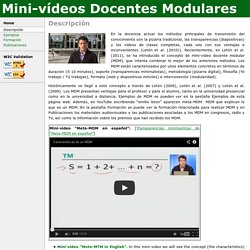
Recientemente, en Letón et al. (2011), se ha introducido el concepto de mini-vídeo docente modular (MDM), que intenta combinar lo mejor de los anteriores métodos. MOOC ‘TICs para enseñar y aprender’ TICs para enseñar y aprender El carácter de este curso es totalmente práctico, no entraremos en discusiones pedagógicas.
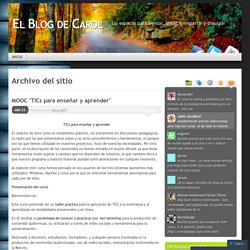
La razón por las que presentamos estos y no otros procedimientos y herramientas, es porque son las que hemos utilizado en nuestros proyectos, fruto de nuestras necesidades. Por otra parte, en la descripción de los contenidos no hemos entrado en mucho detalle ya que estas herramientas están sujetas a cambios que no dependen de nosotros, lo que también lleva a que nuestro programa y nuestro material puedan sufrir alteraciones en cualquier momento.
Al elaborar este curso hemos pensado en los usuarios de los tres sistemas operativos más utilizados: Windows, MacOsx y Linux por lo que se ofrecerán herramientas alternativas para cada uno de ellos. Una formación para el desarrollo profesional docente. ¿Qué modelo docente represento y hacia dónde quiero dirigir mi desarrollo profesional?
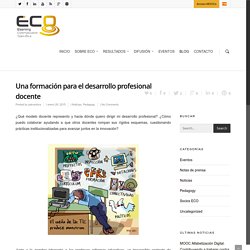
¿Cómo puedo colaborar ayudando a que otros docentes rompan sus rígidos esquemas, cuestionando prácticas institucionalizadas para avanzar juntos en la innovación? Sin embargo, ante la coyuntura descrita, se necesita reconducir el contexto de cambio externo para impulsar el cambio a pie de aula, aprovechando precisamente la propia incertidumbre como motor para revisar las prácticas tradicionales e impulsar una escuela alternativa. Precisamente, estas inquietudes han impulsado la reflexión sobre la mejora del quehacer docente en el MOOC titulado Innovación educativa y desarrollo profesional. Posibilidades y límites de las TIC, en el que hemos alimentando la interacción de los participantes sobre el desarrollo profesional a propósito de la integración de las tecnologías:
La esperanza de los emprendedores sociales. Upoemprende.upo. Tags: emprendedor social; smoocCategoría: Emprendedores Nace sMOOC, nuevo concepto innovador de aprendizaje, que además de un proceso único de aprendizaje, es un proyecto con un impacto social importante de por sí.
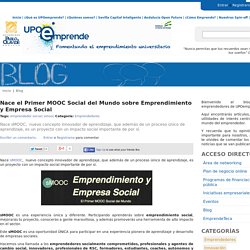
Nace sMOOC, nuevo concepto innovador de aprendizaje, que además de un proceso único de aprendizaje, es un proyecto con un impacto social importante de por sí. sMOOC es una experiencia única y diferente. Participando aprenderás sobre emprendimiento social, mejorarás tu proyecto, conocerás a gente maravillosa, y además promoverás una herramienta de alto impacto en el sector. 2013_el_etal_CIE_v2.pdf. Principios de diseño instructivo para cursos masivos (MOOC) orientados al aprendizaje social.
¿Qué principios deberían guiar el diseño instructivo de los cursos en red con el fin de que estén orientados al aprendizaje social y el fomento de la colaboración profesional entre docentes?
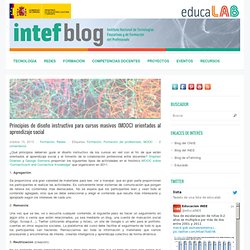
Stephen Downes y George Siemens proponían los siguientes tipos de actividades en el histórico MOOC sobre “Connectivism and Connective Knowledge” que organizaron en 2011: 1. Agregación: Se proporciona una gran variedad de materiales para leer, ver o manejar, que en gran parte proporcionan los participantes al realizar las actividades.
Es conveniente tener sistemas de comunicación que pongan de relieve los contenidos más destacados. 2. Conectivismo en red :-P. Al filo del puente de mayo, Stephen Downes escribe una larga entrada (no es broma :-P) en su blog, puntualizando algunos de los contenidos expuestos por Jon Dron (profesor asociado de Informática y Sistemas de Información de la Universidad de Athabasca) en su reciente artículo "Conectivismo: ¿una teoría del aprendizaje o sobre cómo se aprende?
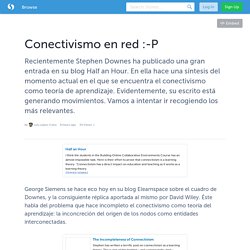
", que enlazamos a continuación. A mí me encantan las metáforas del conectivismo, los paralelismos entre el cerebro y las redes sociales; el caos en el orden, el orden en el caos... Creo que el espíritu del artículo de Jon Dron puede resumirse en una de sus frases más aparentemente banales: It's how you do it, not what it is. Connectivism: a learning theory or a theory of how to learn? Stephen Downes has been making a few waves lately with his recent brief summary of Connectivism as a Learning Theory, which is a great deal easier to read than his 616-page book on the subject (that I confess to only having skimmed, though I read and followed some of the articles that fed into it).
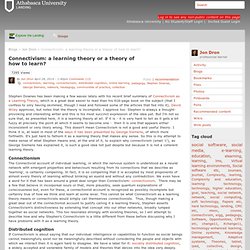
David Wiley approves, but notes that the theory is incomplete. Half an Hour: Response to Dron. I don't want to restate the theses of connectivism as I understand it but it may help readers of Jon Dron's to identify where his exegesis leads him into misunderstanding.
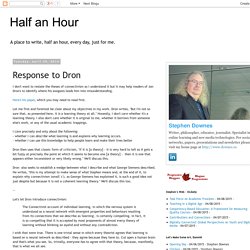
Here's his paper, which you may need to read first. Let me first and foremost be clear about my objectives in my work. Dron writes, "But I'm not so sure that, as presented here, it is a learning theory at all. " Student Survival sMOOC. sMOOC. Social Media for Active Learning – A Professional Development MOOC. MOOCs: taxonomy of 8 types of MOOC. We're not payin' because this guy...
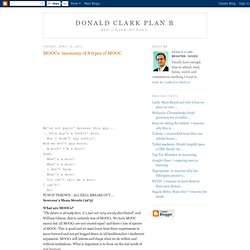
Hub0 ECO Learning. Los MOOC: orígenes, historia y tipos. Historia, definición, tipología y valoración de los Massive Open Online Courses (MOOC). Introducción En noviembre de 2012, el periódico The New York Times publicó el artículo "The Year of the MOOC"1 en el que se declaraba que el año 2012 había sido el año de los Massive Open Online Courses (MOOC) debido a la amplia atención que había recibido este nuevo término por parte de los medios de comunicación y la comunidad educativa mundial. 03. CCK08 - The Distributed Course - The MOOC Guide. ¿Qué es un curso MOOC? MOOC es el acrónimo en inglés de Massive Online Open Courses (o Cursos online masivos y abiertos) Es decir, se trata de un curso a distancia, accesible por internet al que se puede apuntar cualquier persona y prácticamente no tiene límite de participantes.
Un curso en línea abierta masiva (MOOC) es un curso en línea destinado a la participación ilimitada y acceso abierto a través de la web. Además de los materiales de un curso tradicional, como son los vídeos, lecturas y cuestionarios, los MOOC proporcionan forums de usuarios interactivos que ayudan a construir una comunidad para los estudiantes, profesores y los teaching assistants . Aprende en línea de forma gratuita con MOOC. Muchos aspectos de la vida cotidiana se han modificado a causa de los avances tecnológicos. El teletrabajo o trabajo en línea, por ejemplo, ha permitido que las personas ya no tengan que recorrer grandes distancias para llegar a la oficina, ha aumentado la producción y disminuido los gastos de producción y mantenimiento de las empresas.
La educación es un aspecto que también ha sufrido cambios, como las formas de presentar, organizar y guardar nuestras tareas o las estrategias didácticas que incorporan elementos o dispositivos electrónicos al salón de clases. El crecimiento de Internet ha permitido contar con mayor información a nuestro alcance, de manera más rápida y sencilla. El acceso a la información ha dejado de pertenecer a unos cuantos y hoy en día se encuentra disponible para todo aquel que lo requiera en el momento que lo requiera. ECO Project - Step to Step - SMOOC. MOOC en educación: Interactividad y anot...
¿Cómo crear e impartir un Mooc? Seguramente todos los que estáis leyendo este artículo os habréis inscrito ya en algún Mooc, ahora bien, en el caso que queramos impartir uno, seguro que os surgirán las siguientes dudas, ¿cómo lo podríamos hacer? , es decir, en que plataforma o solución se alojaría, ¿qué características tiene que tener un Mooc para considerarse como tal? Cómo convertir un curso tradicional en un MOOC. La revista estadounidense Campus Technology publicaba el artículo How to Convert a Classroom Course Into a MOOC, con una serie de consejos y pasos para que los profesores pasen de dar una mera asignatura en un aula cerrada, a hacerse globales.
Según los autores del artículo lo más costoso es plantear la propia asignatura: crear un MOOC nos llevaría entre 300 y 400 horas... pero si ya sois profesores y tenéis vuestro temario y desarrollo planteados, es tan fácil como ajustarse a ciertos aspectos imprescindibles que relatamos a continuación, y ver cómo tu curso se hace masivo. Veamos. 1. Estudiantes diferentes, clases diferentes. A diferencia de un curso presencial, de universidad o instituto, en los MOOC no sabes la edad de tus estudiantes, ni sus intereses, ni con qué frecuencia deben pasarse por tus clases. 2.
Aprende a diseñar un sMOOC. El Proyecto Europeo ECO, liderado por la UNED pone en marcha el curso gratuito sMOOC Paso a Paso para aprender a diseñar un sMOOC. El curso se imparte en seis idiomas: español, inglés, francés, italiano, portugués y alemán, y comienza el próximo 23 de marzo. El proyecto europeo ECO Elearning, Communication and Open Data: Massive Mobile, Ubiquitous and Open Learning, liderado por la UNED reúne a más de 20 universidades y empresas europeas de 7 países diferentes, con el objetivo de diseñar los Cursos de Acceso Abierto, Online y Masivo (MOOCs) del siglo XXI, incidiendo en los Recursos Educativos Abiertos (OER).
En este marco el próximo 23 de marzo comienza un nuevo curso gratuito titulado sMOOC paso a paso, que ofrece la posibilidad de aprender a diseñar un sMOOC. El curso se realizará en seis idiomas: español, inglés, francés, italiano, portugués y alemán. El inicio de las clases será el próximo 23 de marzo y tendrá una duración aproximada de un mes. Learndash para convertir tu blog wordpress en una plataforma e-Learning LMS - E-Aula. Finalmente y después de algunos meses de espera por el novedoso plugin que permitiría convertir WordPress en un LMS, ya estoy probando la funcionalidades que ofrece y lo sencillo que puede ser convertir tu blog, en una herramienta para dictar cursos a través de Internet con el uso del plugin llamado LearnDash.
Sin duda que no podemos decir que Learndash es una plataforma e-learning, pues creo que sería una falta de respeto para todos aquellos desarrolladores, especialmente aquellos de plataformas de código abierto, pero creo que es una gran alternativa para muchas personas que no desean invertir gran tiempo en conocer y manejar plataformas más poderosas con mucha funcionalidades que probablemente nunca utilizarán.
Primero quiero hacer una pequeña introducción a lo que es Learndash, para aquellos que no la conocen. Descubre como Crear y Vender tu Curso.